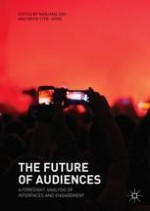2018 | OriginalPaper | Buchkapitel
13. Interfaces and Engagement: From Implications to Responsibilities
verfasst von : Ranjana Das
Erschienen in: The Future of Audiences
Aktivieren Sie unsere intelligente Suche, um passende Fachinhalte oder Patente zu finden.
Wählen Sie Textabschnitte aus um mit Künstlicher Intelligenz passenden Patente zu finden. powered by
Markieren Sie Textabschnitte, um KI-gestützt weitere passende Inhalte zu finden. powered by
